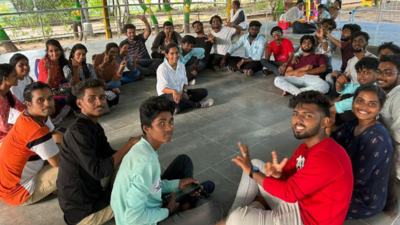CHENNAI: For nine out of 10 people, a job is about a salary. But for one of them, it could be about recovery.As per the National Mental Health Survey 2015-2016, one in ten people in India suffers from mental disorders. What makes matters worse is that most of them find it difficult to get employment, which is a crucial step in their path to wellbeing.“Mental illness can leave a person feeling worthless, physically, emotionally and financially, even within their own family. Just as physiotherapy helps surgical patients regain strength, employment can help with psychiatric rehabilitation,” says psychiatrist Dr C Ramasubramanian.Which is why a few psychiatrists, hospitals and not-for-profits have begun running job fairs and employment programmes to help those with mental illness move from isolation to independence.Among the most prominent is a free employment exchange run by city-based Schizophrenia Research Foundation (Scarf) in partnership with Chennai Psychiatric Society. More than 200 people and 20 employers gathered at their job fair on Saturday, open exclusively to all with mild to severe mental illness. It was a response so overwhelming that Scarf has planned another on Dec 3, World Disability Day. “Scarf also trains candidates in resume writing, interview skills and basic technical competencies before the fair,” says Dr R Mangala, psychiatrist and programme coordinator. “But I’ve found that training candidates is not as much of a challenge as it is to change employer attitudes.” At the fair, she says, doctors are always asked: Will they turn violent in the workplace? Will they take leave frequently? Can they handle only basic tasks?”Her answer: “No, no, and no. And we’re happy to keep repeating it if it means at least one more employer is willing to listen.”Once convinced, some employers become steady supporters, says Dr Mangala. The Indian Oil petrol station outside the Scarf office in Anna Nagar now regularly hires people recovering from mental illness. “We’ve never had a complaint from him or the employees,” she says.Research shows returning to work restores self-esteem, says Dr Aarti Jagannathan, consultant in psychiatric rehabilitation at Nimhans which runs a similar programme.“We conducted a govt-supported study after the Rights of Persons with Disabilities Act, 2016 came into effect to assess whether people with severe mental health issues such as schizophrenia or bipolar disorder could be employed and, more importantly, sustain thosejobs.”More than half of those who came in forvocational rehabilitation were placed, she says. Follow-ups show most clients have stayed in their jobs for at least a year, supported by regular OPD visits and check-in calls to manage medication and workplace issues. Nimhans is now working with the Karnataka govt to identify job/ post identifications for people with mental illness under the 4% disability quota.Scarf and Nimhans use assessment tools to classify candidates as job-ready, trainable with support, or needing further engagement, basedon which they also offer rehab plans, job matching and counselling. “People with mental illness value employment,” says Dr Aarti. “We haven’t formally tracked attrition, but our experience shows they tend to stay longer because they know how hard-won the opportunity is.”Some return to jobs they held before the illness. Others, whose illness may have led to cognitive decline, are guided toward lower-stress, lower-pressure jobs. “Night shifts are discouraged, as disrupted sleep can trigger relapse,” says Dr Mangala.“Most people with mental illness don’t struggle with tasks or technology, they freeze in social situations,” says D Srinivasan, district managerat Magic Bus, which trains young adults to be job-ready. Magic Bus runs a 45-day programme for youth aged 18-25 from low-income backgrounds. “We use activity-based learning tohelp them open up,” says Srinivasan. “When asked to describe themselves as an animal or object, for instance, we found many say ‘ant’ indicating they feel insignificant, or ‘paper’ (discarded), words that help us begin conversations about self-worth.”Ajan Kumar, among those trained at Magic Bus, says he spent years battling depression, making it difficult for him to hold down a job. “My last job was at a bank, which I had to leave in 2024,” says the 35-year-old who was also diagnosed with attention deficit hyperactivity disorder a year ago. “It is hard for me to talk to people.”Trainees learn basic workplace skills like introducing themselves on their first day at work. A buddy system pairs them with empathetic peers, and HR managers meet candidates in advance to ease stigma.In two years, 54 youth with mental illness have been trained, and 34 placed in retail and IT roles, says Srinivasan. Scarf has placed 162 people in jobs over the past three years, while Dr Ramasubramanian’s M S Chellamuthu Trust and Research Foundation (MSCTRF) has been running a placement programme in Madurai for a decade and matched more than 200 people with employment and self-employment.“Many patients from rural backgrounds are given agro-based rehabilitation,” says Janarthana Babu, MSCTRF coordinator. “We have tied up with a state university so they can earn diplomas, get loans, buy livestock, and make a living selling milk.”Rural Tamil Nadu seems to be more inclusive, say psychiatrists. People with mental illnesses find work in agriculture, under govt schemes like MGNREGA, or in neighbourhood shops. “The community knows them, they’re given light tasks, and there’s no formal hiring process. It works,” says Dr Mangala. In cities, it’s harder. There’s more commuting, late hours, which for those on medication can lead to relapse. “What they need is a bit of flexibility, something most companies can’t offer,” she adds.Many also choose not to disclose their illness. “They’re doing well, holding jobs, even winning awards, but won’t reveal their condition to employers,” says Dr Mangala. One client won a ‘best teacher’ award; another runs a YouTube channel. Both declined public recognition fromScarf. “The stigma, especially among educated professionals, is still huge.”Ajan says that’s why he chooses to speak up. “I want more people to talk freely about what they’re going through. Why should we have to hide? We exist and we want to work.”











